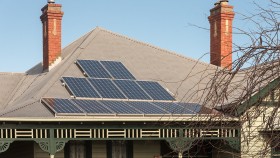Event summary - Economic Opportunities from Offshore Wind Power: the Role of Industry Clusters
In its recently released 2021 Annual Report the Global Wind Energy Council recorded a bullish picture for the offshore wind sector, projecting more than 70 gigawatts of offshore expected to be added globally between 2021 and 2025.
Amongst a number of key drivers behind this bullish view is the role of key markets in the Asia-Pacific, including Taiwan, Japan, Vietnam, and South Korea. Now, with the Australian Federal government tabling its framework legislation for offshore wind power development, Australia is in a position to participate in the Asia-Pacific market at scale.
On 15 September the Institute for Climate Energy and Disaster Solutions (ICEDS) at the Australian National University held a seminar on Economic Opportunities from Offshore Wind Power – the Role of Industry Clusters. Seminar participants heard from key stakeholders in Europe, and in Australia, about robust strategies for industry development and capturing economic value from scale-up in the offshore wind industry.
Speakers were Mr. Matthieu Ballu, policy officer in the team in charge of renewable energy policy in the Directorate-General for Energy, at the European Commission, Mr Marc Itgen. Managing Director of the Business Development Agency of the City of Cuxhaven in Germany, Ms Elisabeth Haugland Austrheim, Project Manager for Norwegian Offshore Wind Cluster, and Dr Nadia Leibbrandt, who is the Project Director for Commercial and Investment Attraction in the Victorian Government’s Department of Environment, Land, Water and Planning, where her team is leading the development of an offshore wind sector strategy for Victoria.
Mr. Ballu highlighted the economic growth potential from the development of an offshore wind sector, along with the importance of developing a predictable legal framework to enable marine spatial planning, and the importance of coordination in regional supply chain development, including port infrastructure and skills development.
Mr. Itgen and Ms. Austrheim showcased the opportunities and different approaches available to policymakers engaged in offshore wind industry cluster development. Dr. Leibbrandt noted that Victoria is positioned to grow a robust and environmentally sustainable offshore wind sector that supports both economic growth and decarbonisation, and is developing an offshore wind sector strategy while engaging with stakeholders and partners. Overall, the workshop showcased the opportunities available for industry clusters to support industry scale-up in Australia, as well as the opportunity for lesson-learning from the European experience in early-stage industry development.
The seminar was supported by the Strategic Partnerships for the Implementation of the Paris Agreement (SPIPA), commissioned by the German Federal Ministry for the Environment, Nature Conservation and Nuclear Safety, and co-funded by the European Union.
You can watch the recording of this event by clicking on the 'Play' button in the middle of the image above, or here on our YouTube channel.
Disclaimer: The seminar was supported by the Strategic Partnerships for the Implementation of the Paris Agreement (SPIPA), commissioned by the German Federal Ministry for the Environment, Nature Conservation and Nuclear Safety, and co-funded by the European Union, and the opinions expressed are the sole responsibility of the speakers.











